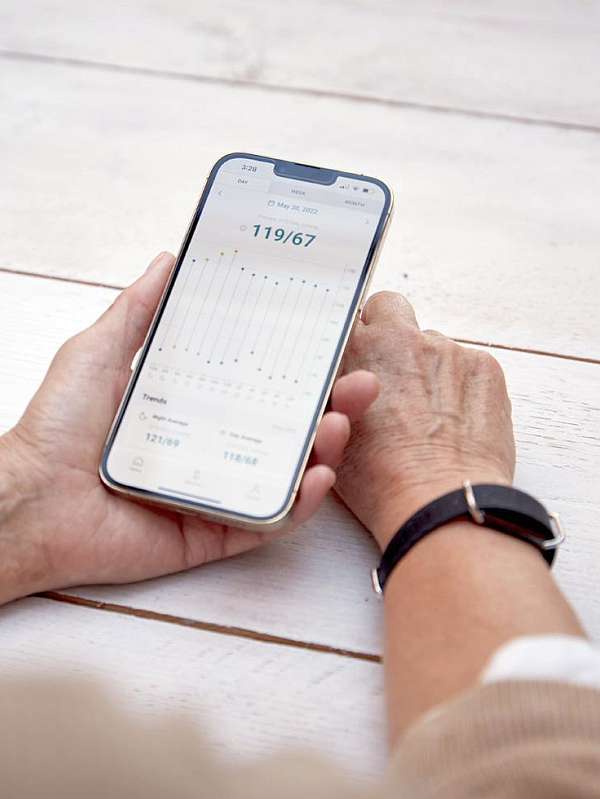You’re probably aware that your blood pressure temporarily rises under certain circumstances, like right after a tough workout or a salty meal. If you’re monitoring your blood pressure, you may be wondering what’s the best time of day to take your blood pressure, so that you get the most accurate reading possible.
If you’re taking your readings at your highest or lowest times during the day, you could have the wrong impression about your blood pressure risk, and you could be overmanaging, undermanaging, or completely neglecting it.
That is why taking blood pressure readings at the optimal time each day is a good idea.
The right time to take blood pressure readings depends on your lifestyle and daily routine. In this guide, we will explore when to take blood pressure readings and general tips for taking them.
When should you take your blood pressure?
Blood pressure fluctuates continuously throughout the day and is usually at its highest during exercise. Resting blood pressure is likely to be at its lowest first thing in the morning. The best method to assess your overall blood pressure is to take multiple readings at different times of the day to get an average blood pressure level.
Choosing what time to take these readings depends on your daily habits. But to have an accurate range of your blood pressure, it is helpful to take readings at different times throughout the day.
Factors that can affect your readings
Blood pressure can be affected temporarily by the following factors (amongst others):
- Eating a substantial snack or a meal could lower blood pressure because your blood is directed to your digestive system. If you eat a highly processed or salty meal, your blood pressure may rise.
- Drinking caffeinated beverages. Caffeine makes your heart beat a little faster, which can increase your blood pressure.
- Smoking. Smoking is a well-established cause of elevated blood pressure.
- Exercising may reduce your average blood pressure over time, but your blood pressure rises during a workout and for a period thereafter.
- Drinking alcohol. Regular alcohol consumption can lead to hypertension.
- Taking medications. Blood pressure medications are designed to lower your blood pressure. Other medications such as decongestants, antidepressants, and others may raise your blood pressure.
It is always best to take your blood pressure reading when you’ve not engaged in any of the above activities for a time. A good rule of thumb is to leave 30 minutes between doing any of the above and taking a blood pressure reading.
What time of day is blood pressure highest
Typically, blood pressure is at its lowest upon waking and just before sleep, and peaks in the middle of the day.
Still, it’s highly individual. Depending on your unique makeup and habits, blood pressure peaks at different points throughout the day. If you’re taking multiple readings as the day goes on, you can start recognizing patterns and plan your blood pressure readings accordingly.
High blood pressure at night
Some people experience high blood pressure at night, known as nocturnal hypertension. If you notice your blood pressure readings at night are high compared to daily readings, you might look into a number of causes. Some of the more common ones include:
- Sleep apnea: when you stop breathing during sleep, and that sets off your body’s panic button to wake you so that you resume breathing. This surge of stress will elevate your blood pressure.
- Rapid eye movement (REM) sleep phase: the dream state. Some people have arousing or frightening dreams that might cause an increase in heart rate and blood pressure.
- Nocturia: the need to get up and urinate in the middle of the night.
Even if it seems minor to you, elevated blood pressure at night is associated with cardiac events and organ damage if it’s severe enough. Your doctor may want to help you manage your blood pressure at night as a preventive measure.
If you notice your blood pressure is higher at night, be sure to take a few readings during the day as well so that you and your doctor can assess your pattern over time.
High blood pressure in the morning
High blood pressure in the morning is known as morning hypertension, and it’s defined as a blood pressure elevation that occurs between 6:00 am and 10:00 am.
While it is not thoroughly understood, one of the potential causes is activation of the sympathetic nervous system when your body shifts from automatic processes like breathing and heart beating to active processes like walking and eating. Another possible cause is inadequate use of blood pressure medications.
If you notice your blood pressure readings are unusually high in the mornings, be sure to take a measure your blood pressure during the day as well so that you and your doctor can establish a pattern and decide the best path forward.
How do you measure blood pressure?
There are various ways to take a blood pressure reading. The method most people are familiar with is to use a sphygmomanometer, an inflatable arm cuff used to measure systolic and diastolic blood pressure.
General steps for taking a blood pressure reading using a BP cuff:
- Familiarise yourself with the device to ensure you follow the correct steps
- Sit in a relaxed seated position
- Rest your arm on a flat surface such as a table and allow the device to take a reading
- Take another reading 3 minutes later
- Make a note of the readings
It is best to keep your blood pressure notes over time in one place so that you can share your results with your doctor.
Most people realize that high blood pressure should be discussed with your doctor, but keep in mind that your doctor should know about low blood pressure readings, too. Low blood pressure does require medical management.
This manual process is effective but requires discipline to carry out on a daily basis.
Technological developments have created more subtle blood pressure monitoring devices that can be worn throughout the day. Blood pressure wrist monitors such as Aktiia’s can take automated readings throughout the day to provide numerous convenient and accurate readings.
This is particularly useful when trying to gather data on nighttime blood pressure, as there is a substantial body of research have shown that nighttime blood pressure is more highly correlated to cardiovascular risk than standard daytime blood pressure measurements.
To learn more about automated BP readings sign-up to our Newsletter below:
What is a healthy blood pressure reading?
The typical ranges of low, normal and high blood pressure are defined by the European Society of Hypertension (ESH) as:
- Optimal – Less than 120 systolic, less than 80 diastolic
- Normal – 120-129 systolic, 80-84 diastolic
- High normal – 130-139 systolic, 85-89 diastolic
For more information on blood pressure readings, read our guide on blood pressure monitoring.
FAQ About the Time of Day to Take Blood Pressure Readings
What if I work irregular hours?
People who have irregular shift patterns will understandably find it difficult to take regular blood pressure readings. Even just taking a single daily reading will help monitor your health.
Standard cuff blood pressures require a person to plan when they take their blood pressure.
There are, however, new blood pressure sensors which can be worn on the wrist and take automated and continual readings over 12 times a day, which can be particularly useful and convenient to increase the blood pressure data for you and your medical team.
What is the best time to take blood pressure readings?
For many people, the best times to take a reading are in the morning before work, in the evening after work and just before bed. Alert your doctor if you measure unusually high or low readings in the morning or late evening.
When is the best time to take blood pressure medication?
If you measure your blood pressure at multiple points throughout the day for several days, you will notice when your blood pressure typically rises. You may choose to take your medication before your BP rises, but as always, ask your doctor for guidance on when to take any prescription.
Summary
The most important aspect of blood pressure monitoring at home is to check your blood pressure routinely. For many people the best time to take a reading is first thing in the morning before breakfast and last thing before bed. It is important to avoid drinking, eating, smoking or exercising 30 minutes before taking a reading to ensure it is accurate.
Readings have traditionally been conducted using an arm cuff, but modern blood pressure monitors such as Aktiia’s solution can passively and automatically take readings around the clock.
Disclaimer: This article is for informational purposes only and does not contain medical advice, and is not a replacement for medical advice. The information in this article is not intended to diagnose, treat, cure, or prevent any disease. Talk to a qualified medical professional before making any changes to your health regimen.
Sources:
How Does Exercise Affect Blood Pressure? Healthline. https://www.healthline.com/health/blood-pressure-after-exercise (Accessed December 2024)
Salt and your blood pressure. Blood Pressure UK. https://www.bloodpressureuk.org/your-blood-pressure/how-to-lower-your-blood-pressure/healthy-eating/salt-and-your-blood-pressure (Accessed December 2024)
Eating can cause low blood pressure. Harvard Health Publishing. https://www.health.harvard.edu/heart-health/eating-can-cause-low-blood-pressure (Accessed December 2024)
Caffeine: How does it affect blood pressure? Mayo Clinic. https://mayoclinic.org/diseases-conditions/high-blood-pressure/expert-answers/blood-pressure/faq-20058543 (Accessed December 2024)
Smoking and your blood pressure. Blood Pressure UK. https://www.bloodpressureuk.org/your-blood-pressure/how-to-lower-your-blood-pressure/healthy-living/smoking-and-your-blood-pressure (Accessed December 2024)
D. Kim; Ha. J. W. (2016). Hypertensive response to exercise: mechanisms and clinical implication. Clin. Hypertens., 22, 17. https://doi.org/10.1186/s40885-016-0052-y
Alcohol: Does it affect blood pressure? Mayo Clinic. https://www.mayoclinic.org/diseases-conditions/high-blood-pressure/expert-answers/blood-pressure/faq-20058254 (Accessed December 2024)
Medications and supplements that can raise your blood pressure. Mayo Clinic. https://www.mayoclinic.org/diseases-conditions/high-blood-pressure/in-depth/blood-pressure/art-20045245 (Accessed December 2024)
Blood pressure: Does it have a daily pattern? Mayo Clinic. https://www.mayoclinic.org/diseases-conditions/high-blood-pressure/expert-answers/blood-pressure/faq-20058115 (Accessed December 2024)
K. Kario (2018). Nocturnal Hypertension: New Technology and Evidence. Hypertension, 71 (6), 997. https://doi.org/10.1161/HYPERTENSIONAHA.118.10971
J. G. Wang; K. Kario; C.-H. Chen et al. (2018). Management of morning hypertension: a consensus statement of an Asian expert panel. J. Clin. Hypertens., 20 (1), 39. https://doi.org/10.1111/jch.13140
E. A Lambert; K. Chatzivlastou,; M. Schlaich; G. Lambert; G. A Head (2014). Morning surge in blood pressure is associated with reactivity of the sympathetic nervous system. Am. J. Hypertens., 27 (6), 783. https://doi.org/10.1093/ajh/hpt273
Choosing The Right Blood Pressure Monitor. Aktiia. https://aktiia.com/uk/how-to-use-a-blood-pressure-monitor (Accessed December 2024)A Guide to Low Blood Pressure (Hypotension). Aktiia. https://aktiia.com/uk/how-to-manage-low-blood-pressure (Accessed December 2024)



